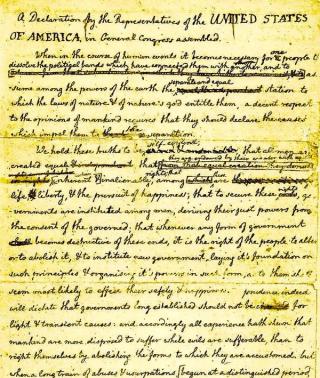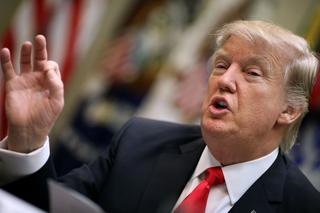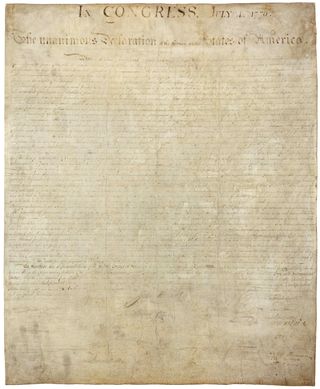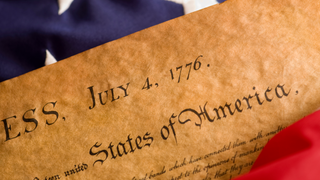The 4th of July is an important date for many to reflect on the ideals enshrined in the US Declaration of Independence: freedom, nationhood, and the unalienable rights of the people to life, liberty, and the pursuit of happiness. In 2020, these words continue to carry tremendous weight, as the United States faces off against unprecedented trials and tribulations. Though only halfway through the year, Americans have faced a pandemic of unprecedented proportions, COVID-19-fuelled economic collapse, and all while trying to grapple ahead of one of the most hotly debated presidential elections to date.
In light of this, we asked our experts to weigh in on what the Declaration of Independence, which sealed the 4th of July into the history books, and what the day itself means to them.
What is your favorite thing to do on the 4th of July? If you’re in Australia, what’s your favorite thing to do on the 4th of July in Oz?
CEO, Professor Simon Jackman - Talk to my friends in the US, roll across the time zones, East back to the West Coast.
Senior Fellow, Dr Charles Edel - BBQ, Watch Fireworks, Read the Declaration of Independence
Non-Resident Senior Fellow Bruce Wolpe - This July 4, we will be at a screening of HAMILTON from Broadway. It doesn't get more patriotic than that!
Senior Lecturer, Dr David Smith - My annual July 4th ritual is watching the video of Marvin Gaye singing the national anthem at the 1983 NBA All-Star game. It's the greatest version ever sung.
Senior Advisor, Jared Mondschein - As an American abroad, my favorite thing to do is remind myself that it’s okay that while I don’t have a holiday for my country’s independence day, I am given a random day off for the “Queen’s Birthday” even though it’s not actually anywhere close to her real birthday and it’s not even the same day as all the other Australian states, let alone other Commonwealth countries because of tradition or something?
Non-Resident Fellow, V. Kim Hoggard - For many Americans, July 4th is also about being with family. Even though I have lived in Australia for over 30 years, most of my 4th of July celebrations have taken place at large family gatherings on the east coast of America. These visits have created a deep bond for my children with the American half of their family, taught them so much about US and Native American history, and helps inform their understanding of where the nation finds itself today.
Non-Resident Fellow, Dr Lesley Russell - When I lived in US we would head to the Rocky Mountains. Although a Nantucket July 4 was memorable for lobster and water cannons from the Fire Department in the streets. In Australia, we head to the Rocky Mountains, though sadly not possible this year because of the coronavirus pandemic.
What is your number 1 must-watch movie and/or must-listen-to song on the 4th of July?
Professor Simon Jackman - Working my way through the American cinematic canon with our dual-citizen kids! But sampling different versions of the Star-Spangled Banner something of a family tradition now: Whitney and Marvin…sorry, Fergie.
Dr Charles Edel - My movie pick would be The Sandlot, and for the song, Bruce Springsteen's Born in the USA, though lyrics are not what most people think they are.
Dr Lesley Russell - The song America the Beautiful
Lecturer, Dr Gorana Grgic - The live capture of Hamilton that will be premiered just a day before the Independence Day is a must-see this year. As the Founding Fathers’ triumphs and failures are subjected to increased scrutiny, Hamilton’s subject matter and the questions of “Who lives, who dies, who tells your story'” are as relevant as they were when it premiered in 2015.
Bruce Wolpe - It's a tie between 'West Side Story', 'Dr Strangelove, or How I Learned to Stop Worrying and Love The Bomb', or 'The Godfather' (Number 1, of course).

Dr David Smith - Poltergeist. A hilarious satire of Reaganism masquerading as a horror movie which opens, appropriately enough, with the national anthem.
Jared Mondschein - Movie would definitely have to be The Sandlot. The song - Marvin Gaye’s rendition of the anthem at the 1983 NBA All-Star game. Best rendition ever. Simply not debatable.
What is your most memorable quote from one of the Founders or from the Declaration of Independence and why is it important to you?
Professor Simon Jackman - None of the other Founders could match Benjamin Franklin for his wit or joie de vivre. I’m especially fond of the famous exchange between Franklin and Elizabeth Willing Powel that produced Franklin’s memorable phrase: “A Republic, If You Can Keep It.” Franklin was an old man by the time of the Constitutional Convention. He knew well the responsibilities that future generations — ours included — must bear so as to realise and preserve the Declaration.
V. Kim Hoggard - John Adams, for me, remains the standout Founding Father because of his belief in a system of checks and balances, separation of powers between the three branches of government, and his support for the right to counsel and presumption of innocence. Adams abhorred slavery and never owned slaves himself. He also felt the creation of political parties would never result in grand solutions, only compromised ones. Adams especially impresses me because throughout his entire life he listened to and took the advice of his brilliant wife, Abigail Adams. Their 1000 letters to each other make clear her incredible strength, intelligence, and enlightened influence on him.
Having worked in the White House myself, I especially like what Adams wrote to Abigail upon arrival at the mansion as the first President to reside there: “May none but honest and wise men rule under this roof”.
Dr Charles Edel - “The truths of the Declaration of Independence are not limited by time or place,” John Quincy Adams wrote in 1839. “They belong to the nature of man in every age and every clime. They may be subdued, but they can never be suppressed. They are truths at Constantinople and Pekin, at London and Paris, at Charleston and at Philadelphia.” Adams believed that the Declaration of Independence showed that America was an idea and an ideology as much as it was a place.
Bruce Wolpe - I came across this image this week, the edits being made to the Declaration, and that drafting session says it all. (pictured right)

Dr Lesley Russell - “If particular care and attention is not paid to the ladies, we are determined to foment a rebellion, and will not hold ourselves bound by any laws in which we have no voice or representation.” ... Abigail Adams (yes, I know, not a Founder, but the power behind one)
Dr David Smith - Much of the Declaration of Independence, once you get past the beautiful political poetry at the beginning, is conspiracy theories. These are as foundational to American political culture as life, liberty, and the pursuit of happiness. It's important to recognise that. The bit I always read to my students, which is about King George, is "He is at this time transporting large Armies of foreign Mercenaries to complete the works of death, desolation, and tyranny, already begun with circumstances of Cruelty & Perfidy scarcely paralleled in the most barbarous ages, and totally unworthy the Head of a civilized nation."
Jared Mondschein - Everyone has heard “all men are created equal” and “Life, Liberty and the pursuit of Happiness”. What fewer remember is that the Founders prefaced those statements with “We hold these truths to be self-evident”. I think about that often because there are so many truths that appear self-evident now that seemingly weren’t then – most glaringly the need for these rights to apply to all Americans, not just white land-owning men. I also think about what truths will appear self-evident in the future that aren’t so now.
Director of Trade and Investment, Dr Stephen Kirchner - Perhaps one of the most memorable for me is this Lincoln quote from his second annual message to Congress: “In giving freedom to the slave, we assure freedom to the free -- honorable alike in what we give, and what we preserve. We shall nobly save, or meanly lose, the last best hope of earth.”
With the US election looming, what does the 4th of July mean for you in 2020?
Professor Simon Jackman - The mid-point of a momentous year, this celebration of American independence set against dire public health and economic circumstances, making it a moment for reflection about the trajectory of American power, politics, and prestige.
Dr Charles Edel - When asked what form of government the new nation had, Benjamin Franklin is reported to have said, "a republic, if you can keep it." This July 4th, I'm thinking about the importance of civic participation in a democracy, the ability to hold our leaders accountable, and the need for everyone to vote in the upcoming election.
Bruce Wolpe - Only the future of the Republic, if we can keep it.
Dr David Smith - We would all like to think of the 4th of July as this moment that brings the country together, but in the last few years, it has instead highlighted political polarisation - last year especially. This year is unlikely to be different.
Jared Mondschein - To me, it means that if you’re an American and you’re not registered to vote, then you have no excuse to complain about voting results.

Dr Lesley Russell - This year for me, the 4th of July means anger at President Trump’s rally at Mt Rushmore, in complete disregard of coronavirus and environmental protections.
V. Kim Hoggard - Growing up in America, I have indelible childhood memories of singing the Star-Spangled Banner often at school assemblies and citing the Pledge of Allegiance daily. Throughout all the years of schooling, we learned of “the Founding Fathers” extraordinary vision of a democratic nation and the gift to us of the “Charters of Freedom”. July 4th has an extra poignancy for me knowing that two of those “fathers”, John Adams and Thomas Jefferson, great rivals and then friends, died on this day, just hours apart, both 90 years old.
July 4th is a day of celebration of nationhood borne out of conflict and compromise. Today US history is still taught with the nationalistic overtones I grew up with, but there is a broader critique of the challenges Americans face in the 21st Century. In 2020, protests against racial injustice remind us that none of the forefathers, or their writings, were without flaws, and neither is the nation “a more perfect union”.
Almost 250 years after it was written, has America realised the aspirations in the Declaration of Independence?
Professor Simon Jackman - The Declaration states that our rights to life, liberty, and the pursuit of happiness are unalienable and that the purpose of government is to “secure” these rights. These rights are patently not universally secure across the American population, but instead flow unequally, across contours of racial and economic inequality, and to such an extent that the aspirations of the Founders are yet to be realised.
Dr Charles Edel - America's appeal has never been that it is a perfect democracy, but rather that it has the ability to struggle with its own failings and hold itself to a higher standard. In the face of injustice at home and oppression abroad, America's cause is the cause of the world - but only if that cause is one where the country strives to live up to its ideals and encourages others to do so as well.

Dr Gorana Grgic - As it approaches its 244th anniversary of independence, the myths of America’s creation are being interrogated more than any time in recent decades. The promise of what were truly revolutionary ideas in 1776 – that all men are created equal – was juxtaposed to a cruel reality of deep racial inequity and subjugation of Black Americans. The ideals espoused in the Declaration of Independence and the resistance to King George III sending “swarms of Officers to harass our people” resonate all the way to the recent wave of Black Lives Matter protests. Given the scope of participants and magnitude of the protest movement, there is a renewed hope that the injustices against America’s most vulnerable and minority groups begin to be addressed.
Bruce Wolpe - The genius of America is that it continues to strive towards fulfilling them; the work of democracy is never over.
Dr David Smith - The aspirations of that document were vague enough that people would always disagree over what they were. Most American political conflict involves some basic disagreement over what the founding principles are supposed to be.
Jared Mondschein - No but that’s the point – it never will. The values that informed the Declaration of Independence – equality, justice, human rights – can never be perfectly realized because humans are inherently flawed. They will remain an ideal we will never stop trying to realize.
Dr Lesley Russell - Only in as much as it continues to be aspirational for so many Americans.





